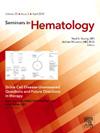Report of Consensus Panel 5 from the 12th International Workshop on Waldenstrom's Macroglobulinemia on the management of patients with intolerance or resistance to covalent BTK inhibitors
IF 4.1
3区 医学
Q1 HEMATOLOGY
引用次数: 0
Abstract
Over the last decade, covalent Bruton tyrosine kinase (BTK) inhibitors have become a standard option for treating patients with symptomatic Waldenström Macroglobulinemia (WM) in the frontline or relapsed settings. However, the definition of intolerance and resistance to covalent BTK inhibitors has not been established. Understanding the best approaches to managing such patients is crucial to avoiding premature abandonment of effective therapy or pursuing futile therapies unlikely to be effective in controlling symptomatic disease progression. With the advent of noncovalent BTK inhibitors and BCL2 antagonists, in addition to clinical trials evaluating phospholipid-drug conjugates, antibody-drug conjugates, and bispecific antibodies, the present Consensus Panel 5 aims to establish working definitions for intolerance and resistance to covalent BTK inhibitors, as well as provide strategies to identify and manage these issues not infrequently encountered in clinical practice.
第12届Waldenström巨球蛋白血症国际研讨会共识小组关于共价BTK抑制剂不耐受或耐药患者管理的报告。
在过去十年中,共价布鲁顿酪氨酸激酶(BTK)抑制剂已成为一线或复发环境中治疗症状性Waldenström巨球蛋白血症(WM)患者的标准选择。然而,对共价BTK抑制剂的不耐受和耐药的定义尚未确定。了解管理此类患者的最佳方法对于避免过早放弃有效治疗或追求不太可能有效控制症状性疾病进展的无效治疗至关重要。随着非共价BTK抑制剂和BCL2拮抗剂的出现,除了评估磷脂-药物偶联物、抗体-药物偶联物和双特异性抗体的临床试验外,目前的共识小组5旨在建立对共价BTK抑制剂不耐受和耐药的工作定义,并提供识别和管理这些在临床实践中并不罕见的问题的策略。
本文章由计算机程序翻译,如有差异,请以英文原文为准。
求助全文
约1分钟内获得全文
求助全文
来源期刊

Seminars in hematology
医学-血液学
CiteScore
6.20
自引率
2.80%
发文量
30
审稿时长
35 days
期刊介绍:
Seminars in Hematology aims to present subjects of current importance in clinical hematology, including related areas of oncology, hematopathology, and blood banking. The journal''s unique issue structure allows for a multi-faceted overview of a single topic via a curated selection of review articles, while also offering a variety of articles that present dynamic and front-line material immediately influencing the field. Seminars in Hematology is devoted to making the important and current work accessible, comprehensible, and valuable to the practicing physician, young investigator, clinical practitioners, and internists/paediatricians with strong interests in blood diseases. Seminars in Hematology publishes original research, reviews, short communications and mini- reviews.
 求助内容:
求助内容: 应助结果提醒方式:
应助结果提醒方式:


